|
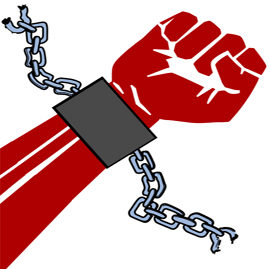 |
CRY FREEDOM.net
formerly known as
Womens Liberation Front
MORE INSIGHT MORE LIFE
Welcome to cryfreedom.net, formerly known as.Womens
formerly known as
Women's Liberation Front
MORE INSIGHT MORE LIFE
Welcome to cryfreedom.net,
formerly known as Womens
Liberation Front.
A website
that hopes to draw and keeps your attention for both the global 21th. century 3rd. feminist revolution as well
as especially for the Zan, Zendegi, Azadi uprising in Iran and the
struggles of our sisters in other parts of the Middle East. This online magazine
that started December 2019 will
be published every week. Thank you for your time and interest.
Gino d'Artali
indept investigative
journalist
radical feminist and womens' rights activist
|
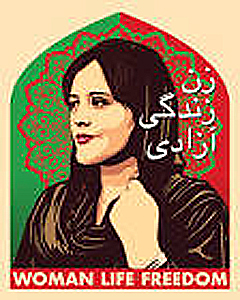 |
|
CLICK HERE ON HOW TO READ
ALL ON THIS PAGE
When one hurts or kills a women
one hurts or kills hummanity and is an antrocitie.
Gino d'Artali
and: My mother (1931-1997) always said to me <Mi figlio, non esistono
notizie <vecchie> perche puoi imparare qualcosa da qualsiasi notizia.>
Translated: <My son, there is no such thing as so called 'old' news
because you can learn something from any news.>
Gianna d'Artali.


JINA MAHSA AMINI
The face of Iran's protests. Her life, her dreams
and her death.
In memory of Jina 'Mahsa' Amini, the cornerstone of the 'Zan.
Zendagi. Azadi revolution.
16 February 2023 | By Gino d'Artali
And also
Read all about the assasination of the 22 year young Jhina Mahsa
Amini or Zhina Mahsa Amini (Kurdistan-Iran) and the start of the Zan,
Zendagi, Azadi (Women, life, freedom) revolution in Iran
2022
and the latest news about the 'Women Live Freedom' Revolution per month in 2023:
October 31 - 16 -- October
15 - 1
--
September 30 - 16
--
September 17 - 1
--
August 31 - 18
--
August 15 - 1
--
August 15 - 1--July 31
- 16
--
July 15 -1--June
30 - 15--June 15-1--May 31 -16--
May 15-1--April--March--Feb--Jan
So here is where the protests continue and I'll continue to
inform you about it. That's my pledge. Gino
d'Artali
Indept investigative journalist
Read also all about the uprising and revolution
around the one-year anniversary of the death of Jina Amini in custody.
CLICK HERE ON HOW TO READ
ALL ON THIS PAGE
When one hurts or kills a women
one hurts or kills hummanity and is an antrocitie.
Gino d'Artali
and: My mother (1931-1997) always said to me <Mi
figlio, non esistono notizie <vecchie> perche puoi imparare qualcosa da
qualsiasi notizia.> Translated: <My son, there is no such thing as so
called 'old' news because you can learn something from any news.>
Gianna d'Artali.
Note by Gino d'Artali: The Zan, zendagi, azadi!> (Women, life,
freedom) will only then end when khamenei and his
puppets i.e. the morality police, the basijis and the irgc give way or go away!!
And
For all topics below that may hopefully interest you click on the
image:
|
'THE NO-HIJABIS
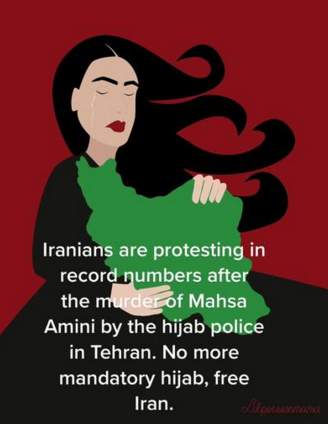
Updated October 18, 2023 |
'BIOLOGICAL

TERROR ATTACKS
AGAINST SCHOOLGIRLS'
Updated October 10, 2023 |
'IRANIAN JOURNALISTS
UNDER SIEGE'

Updated October 18, 2023
|
'BLINDING
AS A WEAPON'
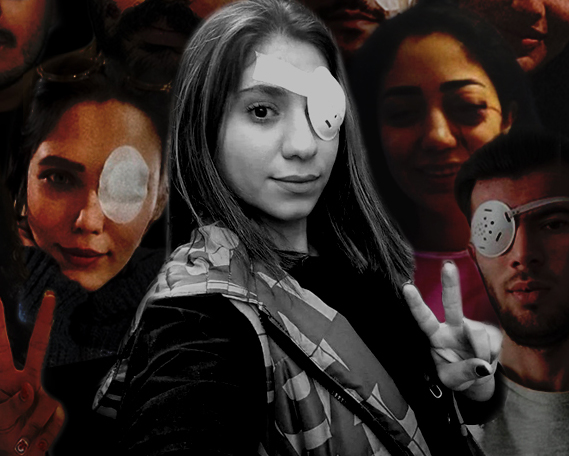
Updated October 14, 2023 |
'THE HANGING SPREE'
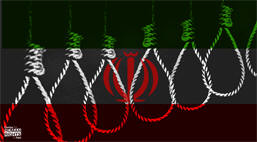
Updated October 10, 2023
|
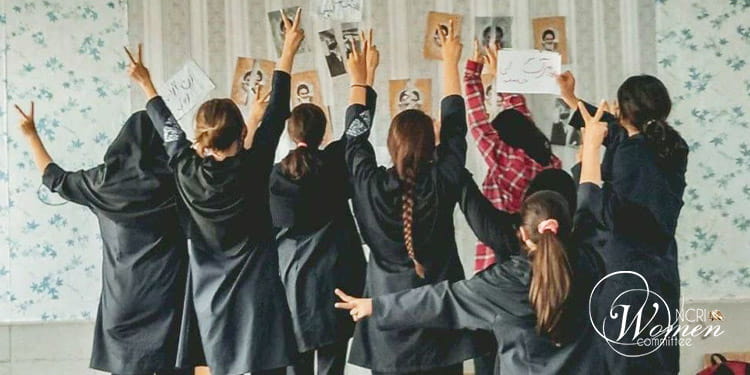
...requirement for women and girls-both teachers and students-to wear the black
head-to-toe Chador?
We say NO: Give In or Give Way!
Iranwire - October 18, 2023
<<Brutal Killing Of Iranian Filmmaker Reminds of Past Political Murders
The recent slaying of renowned film director Dariush Mehrjui and his wife
has caused shock and outrage among Iranians, with many of them drawing parallels
with political assassinations that have rocked the country over the past
decades. The 83-year-old Mehrjui and Vahideh Mohammadifar were stabbed to death
over the weekend in their home in Karaj, near Tehran. Anti-establishment slogans
such as <Women, Life, Freedom> and <Neither Gaza nor Lebanon. My life for Iran>
were chanted at their funeral on October 18. Mehrjui is known as cofounder of
Iran's film new wave in the 1970s that mainly focused on realism. Zahara
Rahnavard, who has been under house arrest since 2010 alongside her husband,
prominent opposition figure Mir Hossein Mousavi, said in a letter that the
stabbing of Mehrjui and Mohammadifar <serves as a grim reminder of the brutal
murder of Dariush and Parvaneh Forouhar.> The 70-year-old Dariush Forouhar and
his wife, both outspoken critics of Iran's religious leadership, were stabbed to
death in their home in southern Tehran in November 1998. The couple ran a small
secular opposition party. <It also evokes memories of the tragic suicides and
mysterious deaths that have befallen artists and other activists,> Rahnavard
also said. Jailed human rights advocate Nasrin Sotoudeh commented on the killing
of Mehrjui and Mohammadifar in a Facebook post, questioning the nature of the
crime. <Regardless of whether this is a politically motivated murder, it
underscores our determination to pursue a referendum to establish a functioning
government. Even in the most optimistic scenario, it is clear that the current
government cannot ensure public security,> she wrote. Speaking to the BBC's
Persian service, firm director Mani Haghighi noted that <just 25 years have
passed since the 1988 series of political murders, and the Iranian people
earnestly hope that such heinous crimes will never occur again.> <The minimum
expectation is a swift identification of the perpetrators of this crime,>
Haghighi said.
On October 15, the BBC's Persian service aired excerpts of a documentary
about Mehrjui, in which he says he is tired of <four decades of deceit,>
referring to the 44 years of Islamic rule in Iran. In another scene, the film
maker removes his wife's headscarf and whispers: <The headscarf is done,
finished, come with me...oh, you have such beautiful hair...my beauty.> >>
Read more here:
https://iranwire.com/en/society/121646-brutal-killing-of-iranian-filmmaker-reminds-of-past-political-murders/
Iranwire - October 18, 2023
<<Jailed Iranian Singer Yarrahi Released on Bail
Mehdi Yarrahi, an Iranian singer who had been arrested for a song
criticizing compulsory hijab rules, was released on bail after spending a month
and a half in custody, one of his legal representatives says. Lawyer Zahra
Minuei said on the social media platform X that Yarrahi was released from
Tehran's Evin prison on October 18. She shared a photograph of the smiling
singer holding a bouquet of flowers. Yarrahi faces a litany of charges,
including <encouraging corruption and prostitution, creating and disseminating
content that contravenes moral and public decency, inciting individuals to
commit crimes and propaganda against the system,> Minuei said. The lawyer said
she expected the verdict to be pronounced in the coming days.
Yarrahi was arrested on August 28 following the release of the song
Roosarito, or Your Headscarf in English, which was accompanied by a video
showing women in various social settings without their mandatory headscarves,
some dancing to the music. Yarrahi dedicated the song to the <brave women of
Iran who shine courageously at the forefront of the 'Women Life Freedom'
movement,'> a reference to the monthslong nationwide protests sparked by the
September 2022 death of Mahsa Amini while she was in police custody for an
alleged hijab violation. As a protest against Yarrahi's arrest, Iranian social
media users posted and shared videos of their own dance performances and
renditions of his songs. A growing number of women have refused to wear a head
covering since the Woman, Life, Freedom protest movement erupted in September
last year. Many of them have been arrested and prosecuted, while dozens of
businesses have been closed for failing to enforce compulsory hijab rules for
women visitors. >>
Source:
https://iranwire.com/en/society/121632-jailed-iranian-singer-yarrahi-released-on-bail/
Iranwire - October 16, 2023 - by MARYAM DEHKORDI
<<The Iranian Government's Failure to <Islamize> Universities
A year has passed since the days when the voices of the people of
Iran resounded once again, echoed by students from universities across
the country. The <Woman, Life, Freedom> movement served as the backdrop
for renewed student protests against the Islamic Republic. The students'
anger triggered by the death in police custody of Mahsa Amini in
September 2022 was so profound that, following the suppression of the
nationwide protests, the government decided to quell dissent within
academic institutions. Ahmad Alamolhoda, the representative of Supreme
Leader Ali Khamenei in Khorasan Razavi province and the Friday Prayer
leader of Mashhad, stressed on October 12 the <necessity of Islamizing
universities.>
He openly acknowledged the government's failure to fully and
successfully <Islamize universities> over the past four decades. These
remarks came amid intensified pressure on student activists, professors
and university institutions. IranWire spoke with one of the editors of
the Amirkabir Newsletter Telegram channel about the actions taken over
the past year to promote the Islamization of universities.
***
During a gathering of university presidents on October 12,
officials from the offices of the representative body of the leader of
the Islamic Republic and the commanders of the professors' Basij in
Razavi Khorasan province, the Friday Prayer leader of Mashhad emphasized
that <Islamizing universities is not a mere academic theory or a passing
trend; it is deeply rooted in the revolutionary principles of Islam.>
Ahmad Alamolhoda also stated that the successful <Islamization of
universities> hinges on the <belief of professors and cultural leaders
in the foundational principles> associated with the Islamization of
universities. This belief, he noted, should extend to influential
figures within the university environment who must embrace this
objective.
Escalation of Gender Discrimination
As part of the students' civil resistance against the Islamic
Republic's government during the <Woman, Life, Freedom> movement, they
challenged <gender segregation> in university dining halls. During last
year's protests, male and female students resisted gender segregation, a
practice employed as a means to suppress students since the
establishment of the Islamic Republic and the Cultural Revolution, and
chose to eat their meals together. Many of those who protested against
the Islamic laws governing higher education have been arrested and
banned from studying, while gender segregation intensified at the start
of the new academic year. <In March, Shiraz University introduced gender
segregation in its cafeteria. Simultaneously, the President of Shahid
Beheshti University, in a forceful response to students protesting
gender segregation, removed tables and chairs from the central library
and summoned some students to the disciplinary committee,> the editor
said. According to this student activist, gender segregation was
enforced in the central library of Shahid Beheshti University a month
after the practice was enforced at Ferdowsi University of Mashhad's
faculty of theology. Around the same time, a wall was constructed in the
area behind the central cafeteria at Zanjan University to separate male
and female students. And in June, the Secretary of the Mechatronics
Scientific Association at Azerbaijan Civil University was dismissed for
opposing gender segregation during a scientific visit to the
association. Simultaneously, the Cultural Vice-Chancellor of Tehran
University's Faculty of Law and Political Sciences divided the study
hall at the faculty and made the library of the World Studies Center
exclusively available to male students. Alamolhoda, who served as the
head of the Islamic Revolution Committee between 1981 and 1983,
attributed the government's failure to implement the Islamization of
university to <the excessive burdens placed on university
administrators.> He said that these administrators, despite being
revolutionaries, are overwhelmed by management tasks, making it
difficult for them to carry out the Islamization of universities.
However, the editor of the Amirkabir Newsletter channel claimed that
university administrators have been making significant efforts to
enforce gender segregation and other Islamization projects in
universities. He cited the request for gender segregation in classes and
labs at Ferdowsi University of Mashhad's Faculty of Mathematical
Sciences, at the library of Sharif University's Faculty of Energy, at
the main entrance of Tarbiat Modares University, as well as the fencing
of student dormitories and gyms.
Hijab Guidelines
The editor of the Amirkabir Newsletter channel said that
Amirkabir University of Technology (Tehran Polytechnic) is <one of the
universities that has rigorously pursued the Islamization plan.> <Just a
few days before the universities reopened, we published a report on the
installation of banners with new hijab instructions for students at the
university's entrance. These instructions forbid girls from using
perfume and boys from wearing belts.>
Furthermore, some female students have been denied accommodation
in the dormitories due to non-compliance with mandatory hijab when
leaving the premises. During the first two weeks of the academic year,
many students were summoned by phone to discuss hijab-related issues.
The numerous security cameras installed across the university
facilitated the identification of students.
Since the beginning of the academic year, banners with hijab
guidelines have been displayed in front of various universities,
including Amirkabir University of Technology, Tehran University, Sharif
University of Technology, Tarbiat Modares University and Shahid Beheshti
University. These guidelines strictly prohibit items such as short
pants, tight pants, piercings, necklaces and earrings for both girls and
boys. Other rules are related to the <length of coat sleeves.>
Girls' Dormitories
According to the student activist interviewed by IranWire, <the
initiative to Islamize higher education is not restricted to university
settings; it has also extended to girls' dormitories.> The activist
mentioned the installation of a camera in the entrance area of girls'
dormitories to monitor their attire: <Several female students have been
called to the security office and reprimanded for their clothing when
entering and exiting the dormitory. The reprimand was severe, focusing
on the 'inadequate hijab' inside the dormitory. Dormitory doors have
been locked, preventing girls from entering if they don't comply with
the dress code, and students have been threatened that their families
would be informed in case of non-compliance with Islamic clothing.>
According to the editor of the Amirkabir Newsletter channel, security
personnel have continued to use CCTVs to identify students who do not
conform to <Islamic dress.> <In certain instances, Basij students have
been enlisted to capture images of students who do not adhere to Islamic
dress with their mobile phones and provide these images to the security
team. After appearing before the disciplinary committee, some students
discovered that there were pictures of them in their files, taken and
kept without their consent or knowledge.>
Purging Universities of Critics
The Etimad newspaper reported that 32,000 teaching professors at
Azad University have been dismissed and replaced with <20,000 first or
second-
semester doctoral students.> Simultaneously, Ahmad Alamolhoda
implicitly suggested implementing a similar plan in public universities
and argued that imposing <strict limitations> on the academic and
educational qualifications of professors poses a problem for the <Islamization
of universities.> Reports suggest that what the government labels <non-hijab,
inappropriate clothing and un-Islamic attire> is, in fact, a form of
civil disobedience in universities and the wider society. Students
employ this method to express their disapproval of the government's
policies. During the <Woman, Life, Freedom> protests, several university
directors were dismissed, and many university professors faced
<suspension> and <expulsion> orders.
The <Islamization of universities> began in the early years after
the 1979 Islamic Revolution through a plan known as the <Cultural
Revolution,> which involved closing universities and expelling thousands
of students and professors for ideological reasons or opposition to the
Islamic Republic.
It gained momentum in the mid-1980s with the backing of the
supreme leader and Mohammad Taqi Misbah Yazdi, a key ideologue of the
Islamic Republic. Extensive measures were also implemented during the
presidency of Mahmoud Ahmadinejad. However, thousands of students joined
demonstrations in recent years, and universities across Iran became
focal points for demonstrations against the Islamic Republic.
Consequently, many students have been suspended or expelled.>>
Source:
https://iranwire.com/en/features/121584-the-iranian-governments-failure-to-islamize-universities/

Iran: Protests Businesses
Hijab Women
Center for Human Rights in Iran
<<Business Owners in Iran Face Economic Reprisals for Supporting
Protests
October 11, 2023 - Business owners in Iran are facing severe
consequences, including loss of livelihoods and restricted access to
vital services such as banking, due to their support for the <Woman,
Life, Freedom> movement. Testimony shared with the Center for Human
Rights in Iran (CHRI) reveal the hardships these entrepreneurs,
including women businessowners, endure. <Since many businesses and shops
closed in solidarity with anti-state protesters in the past year, the
Iranian government is concerned that the business sector could provide
momentum to the protests,> said CHRI Executive Director Hadi Ghaemi.
<Therefore, they are taking measures to suppress any potential organized
protests within the business community.> <By penalizing business owners
who permit customers to exercise their right to freedom of expression,
the Iranian government exposes the extent of its fear of Iran's
women-led movement for change,> added Ghaemi. CHRI notes that forcing
businesses to cease their operations without a trial represents a breach
of the International Covenant on Economic, Social and Cultural Rights (ICESCR),
a treaty to which Iran is a signatory. In particular, this punitive
measure violates Article 6 of the ICESCR, which explicitly prohibits
governments from obstructing individuals' access to gainful employment
and obliges them to ensure that individuals can exercise their right to
work and earn a livelihood in an equitable and just manner.
Woman Business Owner Blocked from Working by Trade Association
<Pari,> whose name has been changed to protect her identity, described
in an interview with CHRI the consequences she faced after closing her
shop in solidarity with the strikes that were called in support of the
protests during the fall of 2022. For security reasons, CHRI has not
disclosed Pari's exact location or industry to protect her from
retaliatory persecution by the Iranian government. We have also withheld
certain details from her testimony that could potentially identify her.
During her interview with CHRI, Pari recounted an experience in which
she faced threats from the bazaari, a group of traditional Iranian
merchants that influences the pricing of goods within her industry. They
wielded the specter of a lawsuit that could potentially endanger her
entire business. However, it soon became apparent to her that this
lawsuit was a mere fabrication, strategically brandished as a means of
intimidation. The ultimate goal was to pressure her into renouncing her
support for the protests that engulfed Iran in September 2022, initially
sparked by the tragic killing of 22-year-old Mahsa Jina Amini while in
state custody, a mere few days after her arrest for an alleged hijab-related
violation.
Pari said:
<On the day I was summoned to the bazaari's office, I was told, 'There's
a private suit against you.' They informed me that some were claiming I
had sold inferior goods or had not paid for the goods I received.
However, no one else was present at the meeting. Typically, in such
cases, both the plaintiff and the defendant are present. When I
inquired, they said the plaintiffs were going to show up. I asked if I
could know their names to identify whom I was dealing with, and they
responded by saying there were many. This struck me as odd since I knew
most of my customers. I realized that the case was baseless.> Pari
shared with CHRI that the bazaari's objective was to <isolate business
owners associated with the movement.> She has since discovered that its
leadership has been constructing cases against her, issuing threats, and
intimidating her, as well as some of her colleagues. <Months have passed
since that meeting, and I'm still entangled in this situation. I am
neither allowed to work nor given access to the names of the
plaintiffs,> Pari informed CHRI. <They have frozen my bank accounts, and
potential investors are hesitant to collaborate with me. At present, I
am in a state of limbo, blacklisted, awaiting to see what fate they have
in store for me.>
New Law Imposes Additional Penalties on Unveiled Women, Businesses Who
Serve Them
Shortly after the onset of the protests that gripped Iran in September
2022, extending over several months and eventually recognized as the
<Woman, Life, Freedom> movement, reports emerged of businesses,
including shops, being forcibly closed. These closures were attributed
to alleged violations of Iran's compulsory hijab laws. Women in Iran
have long faced punitive measures, including detention, for
noncompliance with the country's hijab laws. However, in June 2023, the
Iranian Parliament proposed a new law that not only imposed additional
penalties on unveiled women-including monetary fines, restrictions on
accessing bank accounts, confiscation of personal vehicles, travel
limitations, bans on online activity, and imprisonment-but also extended
punitive measures to individuals, businesses, and institutions accused
of permitting unveiled women on their premises. During the anniversary
week of Iran's <Woman, Life, Freedom> movement, the Iranian government
announced that the bill had received approval from the parliament and
had been forwarded to the Guardian Council, an unelected body of Islamic
clerics tasked with reviewing bills, with its expected endorsement. CHRI
has warned that this legislation not only exposes women and girls to
heightened levels of violence but also deprives them of access to
essential services and empowers authorities to impose penalties without
due process or a fair trial. UN human rights experts have characterized
the bill as a form of gender apartheid, suggesting that authorities seem
to be governing through systemic discrimination to suppress women and
girls into complete submission. They emphasized that the proposed
parliamentary <Bill to Support the Family by Promoting the Culture of
Chastity and Hijab,> along with existing de facto restrictions, such as
the denial of economic rights, constitute inherent discrimination and
may amount to gender persecution. <Denying women their livelihoods and
essential services due to their political beliefs is not just political
persecution; it constitutes gender apartheid,> said Ghaemi. <These
serious human rights violations should be investigated by the UN's
independent Fact-Finding Mission on Iran to hold Iranian authorities
accountable.> CHRI emphasizes that Iranian women entrepreneurs already
contend with a discriminatory and unequal environment created by the
country's laws that relegate them to second-class citizens. Now, in
addition to gender-based disadvantages, they are being specifically
targeted and severely punished for advocating fundamental rights.
Other Business Owners Targeted, Some Bend to Pressure
Pari recalled the turbulent days of September and October 2022, when
protests were raging in cities across the country under the slogans of
<Woman, Life, Freedom> and <Death to the Dictator!> She also described
days when with the help of some of her friends, she tried to help the
families of detainees and injured protesters. Pari told CHRI that unlike
some of her colleagues, she had refused to submit to the threats in
return for economic benefits provided by her business association. <I
have built my own business and brand. Another woman colleague of mine,
who had a similar experience with the bazaari, told me: 'Whatever they
say, don't respond and just go with it.' When the bazaari contacted me,
one of the heads said, 'Do you realize what you're doing, ma'am? How
many complaints are there against you? You've tarnished our industry's
reputation.>
However, some of her colleagues bent to the pressure by their
professional association. <A while ago, I saw one of my colleagues.
During the protests, he was also on the streets, but after the protests
were widely suppressed in September, he stopped going. He's a married
man with two children. His business license was revoked, he was
arrested, and a prison sentence was issued against him,> she said.
She continued,
<However, a few days ago, I saw he had opened a shop in an expensive
location. There were many cameras installed at his business. He admitted
he had been coerced into submission. They told him that if he cooperated
with the bazaari and the security agencies, he could have a prosperous
life again. <He also informed me that speaking to me in public could get
him in big trouble,> added Pari.
Numerous Businesses Shuttered for Alleged Admission of Unveiled Women
Various businesses have been forced to shut down since the eruption of
protests in Iran in September 2023.
For instance, based on CHRI's research, in September 2023 alone, local
authorities shuttered at least two bookstores and a cosmetics
manufacturer in Tehran, two shops in Islamshahr, 10 women's hair salons
in Bandar Abbas, five shops in Semnan, a traditional hotel in Tabriz,
one shop in Yazd, a cafe in Abadan, a reception hall in Mehriz, a cafe
in Shirvan, a cafe in Arak, and a cafe in Saveh. The reason for these
closures was the accusation that their owners allowed unveiled women to
enter their premises. It is not clear whether these shops have all been
permanently or temporarily closed. In June 2023, CHRI documented cases
of women facing violent assaults due to their failure to cover their
hair. Additionally, university students were subjected to fabricated low
grades and barred from attending classes simply because they did not
wear hijabs. Prior to this, on April 22, 2023, the Tehran-based Shargh
newspaper had reported the sealing of nearly 2,000 shops and businesses
on account of reports of unveiled women being present on their premises.
<Brave individuals like Pari have taken significant risks to advocate
for all the women and men in the country who want fundamental rights and
liberty,> said Ghaemi. <The international community must stand in
solidarity with the women and men in Iran who are putting everything on
the line to dismantle this system of repression.> >>
Source:
https://iranhumanrights.org/2023/10/business-owners-in-iran-face-economic-reprisals-for-supporting-protests/
Womens'
Liberation Front 2019/cryfreedom.net 2023











